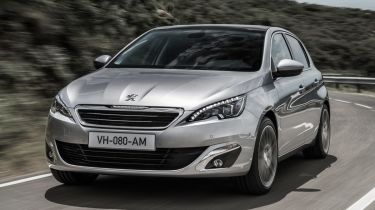Peugeot 308 diesel review
We get behind the wheel of the e-HDi 115 – the most efficient version the new Peugeot 308, a new Golf rival

Buyers looking for a comfortable and economical family car with a touch of class will not be left wanting by the new Peugeot 308. The efficient e-HDi diesel is the most compelling car in the range and tipped to be the best-seller. It may not have the sparkle of the class-leaders or their styling flair but the high specification and low C02 emissions could make it a surprise fleet success.
Although we’ve already tested the all-new Peugeot 308 in flagship petrol guise, this is our first chance to try the efficient e-HDi diesel best-seller.
Until a new 118bhp ‘BlueHDi’ version appears early next year, this e-HDi is the most frugal model in the line-up. Peugeot is banking on company buyers being the first to notice its 95g/km C02 emissions and mid-seventies claimed economy.
That makes it cleaner and cheaper to run (on paper at least) than any VW Golf except the Bluemotion, and almost as efficient as the Volvo V40 D2 (94g/km). The secret of this newfound efficiency is a drastic reduction in weight.
Thanks to a new chassis platform and the extensive use of lightweight materials like aluminium for the bonnet and wings, and composite thermoplastics for the tailgate and boot floor, the 308 is a lot lighter on its feet than before.
Used - available now
Yet despite its fuel-sipping nature, the 308 doesn’t feel like some economy-special to drive. We’ve already praised the e-HDi engine and it’s no less impressive here. Even though it has just a 1.6-litre capacity its very refined once you’re inside and unlike some rivals it’s also flexible enough to feel relaxed and responsive in-gear.
That makes it an excellent cruiser, and the smaller 17-inch wheels of our test car combined extra weight of the diesel engine gave it the kind of soft and cushioned ride that French hatchbacks used to be famous for. There is still the occasional thump from the rear axle over potholes – but you can tell that the suspension has definitely been setup with comfort in mind.
However the artificially quick steering and loose manual gearbox both prevent the 308 challenging more dynamic rivals like the Ford Focus on a winding road. Still, the tight 10.4 metre turning circle and more compact dimensions do make it easy to drive in town, and Peugeot has drafted in new technology like automatic braking at low speeds and collision detection to keep pace with the competition.
The most dramatic change though is on the inside. The new and simplified cabin takes its lead from the 208 but everything from the central touchscreen to the driving position has been executed with greater precision than on the supermini.
Clear shortcut buttons make it easier to navigate the functions and sub-menus and a high level of standard equipment combined with feel-good extras like sat-nav and smartly trimmed seats all help it feel more like a premium product.
Yet when it arrives in January it should be priced aggressively enough to offer a decent value alternative to both the VW Golf or an upmarket and practical rival to cars like the Hyundai i30.











